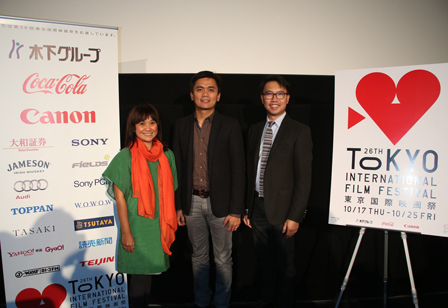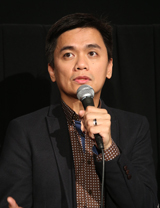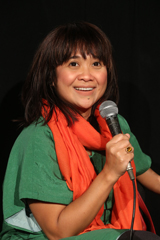
Competition “Barber’s Tales” Press Conference
Jun Robles Lana (Director/Executive Producer/Screenplay)
Eugene Domingo (Actress)
Perci Intalan (Executive Producer)
The title of this Philippine feature sounds tentative, and in fact the press screening marked only the second time it’s even been shown publicly. It is also Jun Robles Lana’s second film, but before starting his directing career he was already an established screenwriter, and it shows in the movie, which is rich in character and situation. As with many recent Philippine independent films the story mines that island country’s recent history as a culture still emerging from more than a century of oppression, both by outsiders and its own leaders.

Jun Robles Lana (Director/Executive Producer/Screenplay)
Set in a rural town in 1975, the height of the Marcos dictatorship, the story revolves around the local barbershop, which is run by Jose, a middle aged man embittered by poverty and the death of his autistic son more than a decade earlier. He takes his frustrations out on his patient wife, Marilou (Eugene Domingo), by making impossible demands and then staying out late drinking and whoring. When he dies in his sleep, Marilou is perplexed by her position: without a son or a husband she feels she has no place in this society and ponders moving to Manila to become a maid. Her friends encourage her to take over the barber shop herself, and she proves to be a natural at the tonsorial arts, so much so that the mayor contracts her services.
During the press conference, a journalist brought up the fact that Lana’s first film was also about a barber. “Yes, maybe I’m a little obsessed with barbers,” he laughed. “In Philippine society the barbershop is an important institution. It’s where the local people share stories and experiences. It’s intrinsic to our society.”

Eugene Domingo (Actress)
It also provides the perfect nexus for his theme, which is the way the political movement against the Marcos regime meshed with the awakening of women’s consciousness. Marilou despairs of running a barbershop because she thinks men won’t want a woman to cut their hair, but once she proves her talent and worth she feels slightly empowered and realizes the injustice of her social status and that of her female friends, who are either prisoners of men’s sexual demands or considered useless because they have nothing to offer men. She befriends the wife of the mayor, a beautiful woman driven to depression by her husband’s infidelities and support of a regime that lies to and tortures its poorest members. This friendship, along with her sympathy for a godson who has decided to join the rebel forces, brings her to a reckoning with fate that is both moving and shocking.
“I am fascinated by the martial law era,” Lana said in answer to a question about his reasons for exploring this particular time. “The repercussions of what happened then continue to be felt even now in the Philippines. In fact, many problems that were widespread at the time, such as lack of family planning and ongoing insurgencies, continue today. But if I were going to make a comparison, I would talk about the situation of women. Things have improved, but not enough. In 2012 there were more than 5,000 documented cases of rape. That’s 14 a day. Also twelve women die every day in childbirth. Women continue to struggle even if gender equality is discussed a lot more.”
Several journalists showed their knowledge of Philippine history and Lana was impressed. He admitted that Marilou, though a fictional creation, falls in line with the pattern of all Philippine heroes. “It’s a fight for progress and equality,” he said. “And it’s been the same since the 1800s. When I was writing the script I always kept in mind our history.”

Perci Intalan (Executive Producer)
He also pointed out that the name “Marilou” was chosen to honor his mentor, Marilou Diaz-Abaya, the filmmaker who gave him his break and who died not long ago. This factoid seemed to surprise the assembled journalists, who just assumed, based on the movie, that women were still kept down in the Philippines, though the presence of Eugene Domingo should have quashed that idea. Domingo is mainly known as a comic player, famous for her tour de force as a prima donna film actress in the farce “The Woman in the Septic Tank.”
“This is the first time I’ve had an opportunity to do a complete dramatic role,” she said. “And it’s hard. We shot in a remote area that looked something like the Philippines in the 70s, a place with no electricity and, of course, no cell phone reception. It was a sacrifice. You just can’t imagine how happy we are being here in Tokyo.”








